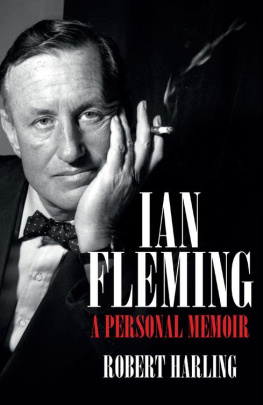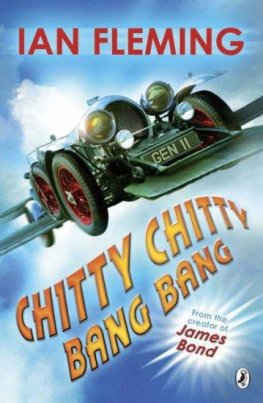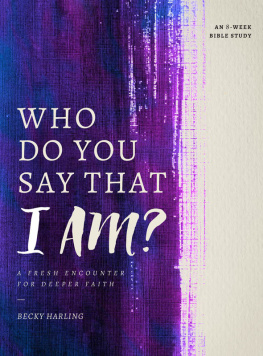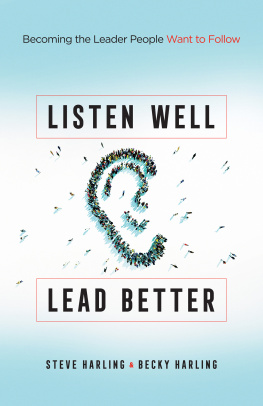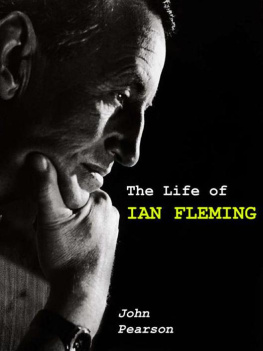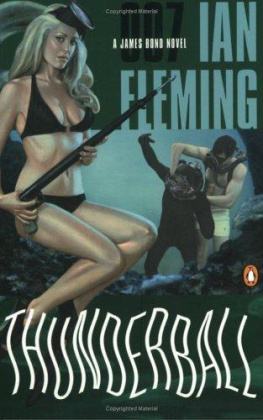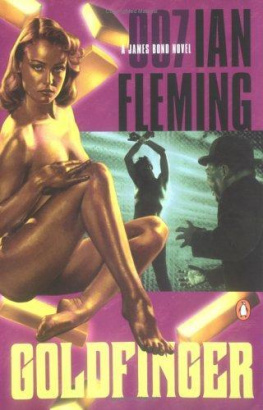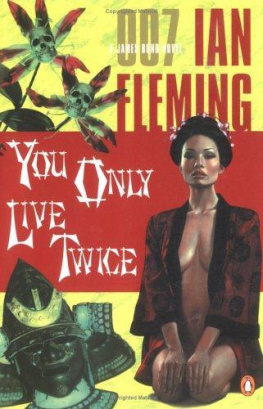Robert Harling - Ian Fleming: A Personal Memoir
Here you can read online Robert Harling - Ian Fleming: A Personal Memoir full text of the book (entire story) in english for free. Download pdf and epub, get meaning, cover and reviews about this ebook. year: 2015, publisher: Perseus Books, genre: Non-fiction. Description of the work, (preface) as well as reviews are available. Best literature library LitArk.com created for fans of good reading and offers a wide selection of genres:
Romance novel
Science fiction
Adventure
Detective
Science
History
Home and family
Prose
Art
Politics
Computer
Non-fiction
Religion
Business
Children
Humor
Choose a favorite category and find really read worthwhile books. Enjoy immersion in the world of imagination, feel the emotions of the characters or learn something new for yourself, make an fascinating discovery.
- Book:Ian Fleming: A Personal Memoir
- Author:
- Publisher:Perseus Books
- Genre:
- Year:2015
- Rating:5 / 5
- Favourites:Add to favourites
- Your mark:
- 100
- 1
- 2
- 3
- 4
- 5
Ian Fleming: A Personal Memoir: summary, description and annotation
We offer to read an annotation, description, summary or preface (depends on what the author of the book "Ian Fleming: A Personal Memoir" wrote himself). If you haven't found the necessary information about the book — write in the comments, we will try to find it.
Ian Fleming: A Personal Memoir — read online for free the complete book (whole text) full work
Below is the text of the book, divided by pages. System saving the place of the last page read, allows you to conveniently read the book "Ian Fleming: A Personal Memoir" online for free, without having to search again every time where you left off. Put a bookmark, and you can go to the page where you finished reading at any time.
Font size:
Interval:
Bookmark:
A s a family, we would like to express our gratitude to literary agent Jonathan Conway for his unremitting and, as Robert would say, zestful commitment to the project, and for steering the manuscript towards the Robson Press. Jeremy Robsons enthusiasm has been boundless, as has Melissa Bonds patience and expertise throughout the editing process.
War artist John Worsleys (19192000) pen and ink drawings were originally commissioned by Robert Harling for Amateur Sailor and The Steep Atlantick Stream, his wartime account of life as an RNVR officer on corvettes escorting the North Atlantic convoys. More examples of Worsleys drawings and paintings are held by the Imperial War Museum.
The writing of these memoirs occupied Robert Harling during the years following, at the age of eighty-three, his reluctant retirement from editing House & Garden. It could have been a difficult period time on his hands, and the fact that his home had been burgled on three successive occasions in as many weeks, with the loss of many of the items he had collected over the years but he was philosophical, saying that, having seen men drown, possessions were irrelevant. What was important was life. Once the house was rearranged to his satisfaction, he immediately got to work on the manuscript, recording his friendship with Ian Fleming. An intermittent diary hed written during the war no doubt proved useful, as did the journal he kept during the Cond Nast years.
He wrote the first draft in longhand, and, after each successive draft was re-typed, he would go through, changing a sentence or two here, a paragraph there literally cutting and pasting as he went. As a typographical designer trained long before computers were introduced, he was handy with scissors and Cow gum. The manuscript remained a work in progress until he died. We feel sure that Robert would have been as thrilled as we are to see the final draft published.
Nicholas, Simon and Amanda Harling
September 2015

W ho was Robert Harling? The author of this wonderfully candid memoir of his great friend Ian Fleming was well known in his day as a typographer and type designer, architectural critic, advertising executive and a notably long-serving editor of House & Garden back in the great era of the glossy magazines. Harling, a handsome and rather raffish character, who stalked around Mayfair in a black fedora, was a key figure in mid-twentieth-century graphic design. He makes an appearance in The Spy Who Loved Me as the expert compositor on the Chelsea Clarion. There are elements of Harling that are clearly recognisable in Flemings creation of the character of Bond. Through two decades of close male camaraderie, which started in wartime naval intelligence, Harling and Fleming shared a multitude of esoteric interests, including an intrepid fascination with sex.
Harling was a master of obfuscation. No one knew where he had come from. He romanticised his past. So much so that even I a friend of his for forty years, veteran of countless intimate lunches at the Causerie in Claridges (Roberts favourite place for entertaining female friends) swallowed the tale he told about his parents dying young and Robert, as a boy, being brought up in Brighton by a family friend, whose husband was a dairyman. This was the account he gave in his semi-autobiographical novel Amateur Sailor, published (typically) under a pseudonym, Nicholas Drew.
It only emerged later, after Roberts death in 2008 at the age of ninety-eight, when I came to write his entry for the Oxford Dictionary of National Biography, that both his parents had survived until well into their seventies. His father had been a taxi driver living in north London. This was where the young Robbie was brought up and went to school. He had also drawn a veil over the fact of his first marriage to a young drapery saleswoman named Mary Adelaide. Harling later became an accomplished thriller writer, but his towering achievement was to fictionalise himself.
When Harling first met Fleming in late summer 1939, just before the outbreak of the Second World War, he was already well established both as a designer and a typographic entrepreneur. With his friend James Shand, Harling conceived and published an innovative specialist graphics magazine. Instead of simply covering conventional fine printing, Typography included lettering on every level. The first issues, for instance, featured Kardomah tea labels; the second contained an analysis of train ticket typography. Harlings eclectic tastes in typographical ephemera anticipated 1960s pop culture in a fascinating way.
Typography formed an immediate bond between the two men, when it emerged that Ian Fleming had subscribed to the magazine right from the beginning. Fleming was, by then, already working surreptitiously in naval intelligence. He had been impressed by Harlings News-Reel Maps for the News Chronicle, a series of data maps and captions containing information for the general public on likely German invasion points in the coming war. Fleming recruited Robert to redesign the admiraltys then lamentably dowdy Weekly Intelligence Report over the first of what developed into a long series of convivial and confidential male-to-male lunch meetings, first at Scotts and later on at the Etoile.
What I love about this memoir is the vivid sense it gives us of the burgeoning friendship between two witty, clever, sophisticated men, very different in background: Fleming, with his establishment values derived from Eton, Sandhurst, the City and the admiralty; Harling, working-class in origin, a self-invented man of charm, ambition and professional finesse. The two men shared a certain inner loneliness. War suited both of them. They both had a taste for action, an almost boyish longing for adventure and escapade.
Harling, always a keen sailor, had volunteered for the navy in the early days of war. In May 1940, in charge of a whaler, he took part in the evacuation of Dunkirk. Promoted to a sub-lieutenant, he then became the navigator of a Corvette, on convoy duty in the Western Approaches. In 1941, conscious of his special talents, Fleming extracted Robert from the navy, recruiting him to work in the Inter-Services Topographical Division (ISTD). This department interacted closely with intelligence in collecting information on ports, beaches and other potential enemy targets. It was something of a cloak-and-dagger operation.
Harlings far-flung foreign forays, travelling under cover, often to exotic places, gave scope for unlimited sexual liaisons. One of these was with Andre, Parisienne mistress of a Turkish bigwig, encountered, Harling tells us, through eye-to-eye contact in an Istanbul caf. Harlings ISTD travels and diversions, reported back to Fleming in such novelistic detail, have obvious parallels in Flemings fictional James Bond. Remember, it was Harling to whom Fleming first confided, over a wartime picnic of Calvados and rations in 1944, his intention to write the spy novel to end all spy novels. James Bond bears a distinct resemblance to Robert in his sardonic elegance of manner and his cool sexual expertise.
Robert talked of Fleming often, with affection and admiration. But, more than I had realised, Fleming played an increasingly influential role in Harlings professional career. After ISTD, Fleming summoned him to join 30 Assault Unit (30AU), the outfit referred to by Robert as Flemings Secret Navy, formed to operate on the front line at the end of the war to capture German codebooks, wireless equipment and security documents before these could be destroyed by the retreating enemy. Harling became the units expert on mines and minefields.
Font size:
Interval:
Bookmark:
Similar books «Ian Fleming: A Personal Memoir»
Look at similar books to Ian Fleming: A Personal Memoir. We have selected literature similar in name and meaning in the hope of providing readers with more options to find new, interesting, not yet read works.
Discussion, reviews of the book Ian Fleming: A Personal Memoir and just readers' own opinions. Leave your comments, write what you think about the work, its meaning or the main characters. Specify what exactly you liked and what you didn't like, and why you think so.

